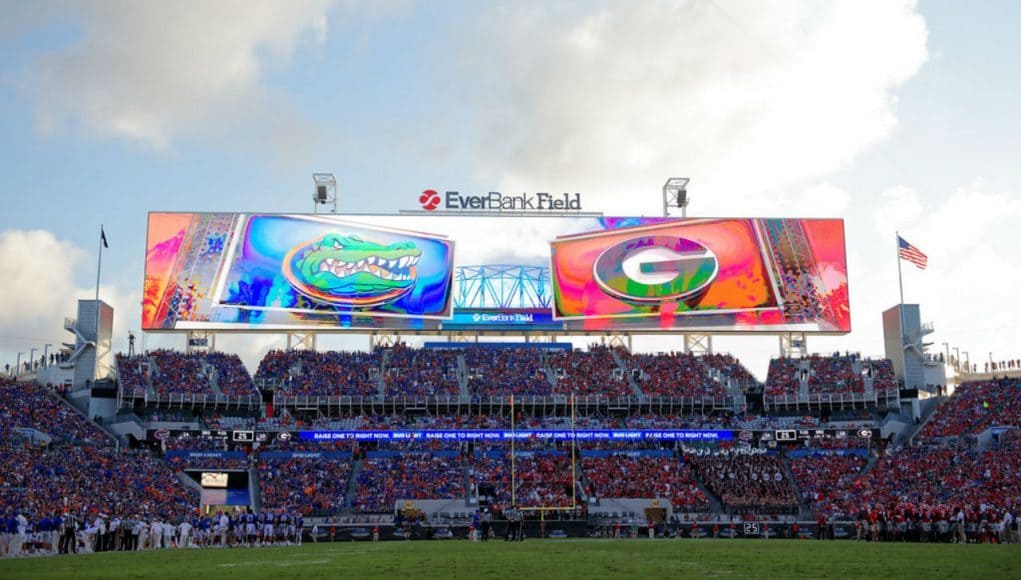Outgoing Jacksonville mayor Lenny Curry made college sports news yesterday by telling local radio station 1010XL that planned renovations to TIAA Bank Field will be major enough that the Jaguars won’t play there for two seasons. Naturally, that means the Florida-Georgia game likely won’t be there for two years either.
I say “likely” because it’s not completely confirmed yet. However, it’s serious enough that if and when the hammers start swinging, it won’t make sense to play the Cocktail Party in its traditional location on the banks of the St. Johns until it’s over.
Curry gave 2025-26 as the years affected, but apparently that’s an aggressive timeline. Scott Stricklin told The Athletic yesterday that he’d heard 2026-27 as the likely seasons.
The game has been played in Jacksonville continuously since 1933, with the exception of the last time the stadium formerly known as the Gator Bowl was renovated to fit NFL tastes. The schools did a home-and-home in 1994 and 1995 while the work went on, which gave Steve Spurrier the chance to hang half a hundred on the Bulldogs both at home in ’94 and in their house in ’95.
The simplest plan would be to replicate that deal: let each team host before returning the game to its ancestral home. It may not end up so simple, but there are some forces that will, or could, rally behind that scenario.
The city of Jacksonville would prefer such a plan. Curry said in his comments that he wanted to have a deal in place to return the series to Jax before the two-year disruption takes place. He also floated the idea of a home-and-home for the two renovation seasons, which wouldn’t give some other neutral site a chance to get its foot in the door.
UGA has also made a lot of noise over the years about wanting to move the series to the campuses. Kirby Smart has been particularly adamant about it when asked because he wants to use it as a big recruiting weekend every other year. Therefore, we could see some momentum for the home-and-home plan from the UGA side, but that doesn’t say anything about what comes after.
We have to remember it’s not 1994 anymore. The college football world was very different back then. It wasn’t even quite a decade after the 1985 NCAA v. Board of Regents of the University of Oklahoma Supreme Court decision that allowed schools and conferences to negotiate their own TV contracts instead of having to take whatever deal the NCAA negotiated.
Money has increasingly driven the bus in college sports since then. Oklahoma is about to join its co-litigant from ’85, the University of Georgia, in the SEC because of money concerns. A lot of previously unthinkable things, like 16-team megaconferences within the NCAA structure and a 12-team playoff, are imminent.
The most obvious alternative to a home-and-home would be to shop the game out to the highest bidder. You could imagine a format where one game is played in Atlanta and the other is played in Tampa, Orlando, or Miami. The schools might be able to get a little extra by selling them separately like that, or they might squeeze a site like Atlanta or Orlando for a premium to get them both as a package.
Of course, the place that might get squeezed the most here is Jacksonville itself. The city has survived a home-and-home before, but you had better believe it doesn’t want anyone to have the really cool experience of the game in any other NFL stadium. Seldom does anyone talk about moving the series around, but if folks have a good time in Atlanta and Tampa or whatever, then it becomes a lot more thinkable that there could be a rotation of some kind. That’s why, I believe, Curry talked of wanting to have a deal in place before the renovation happens. And while I’m sure the city pays extra to keep the game where it is, the price will probably go up if any other cities have a realistic shot at landing it.
I personally would prefer the simple plan of a home-and-home on campus followed by a return to Jacksonville. College football is slowly losing the charm that comes from its historic idiosyncrasies as market forces shave off a lot of the rough edges. Keeping the series in Jacksonville, despite the scheduling oddities that it creates, is one of those quirks that remind you that this isn’t just a minor league developed by suits in a conference room. It’s a great time, and lots of fans on both sides have lots of traditions and customs rooted in the city.
If the game can’t be played in Jacksonville, it should go to the college towns. The campus game environment, and all of the variety that comes with that, remains the core in-person experience for college football. All the variety keeps it from feeling like just another money making enterprise like the NFL. Neutral site contests in pro stadiums haven’t taken over the biggest games like it looked they might a decade ago, and the sport is better off for it.
I see no reason to rotate the game around to different neutral sites. There is almost a century of history with Jacksonville, and by far the best alternative locations are the Swamp and Sanford Stadium. There is just about nothing to be gained by moving it around to different sterile NFL stadiums.
As long as the city of Jacksonville is willing to do what’s required to make it a first-rate experience, and as long as the SEC’s media partners don’t torpedo the arrangement by not putting up the required cash, then the Cocktail Party should go right back to where it is now after its two-year hiatus. And if for some reason that becomes untenable in the future, the only place the series should go is to the campuses.


